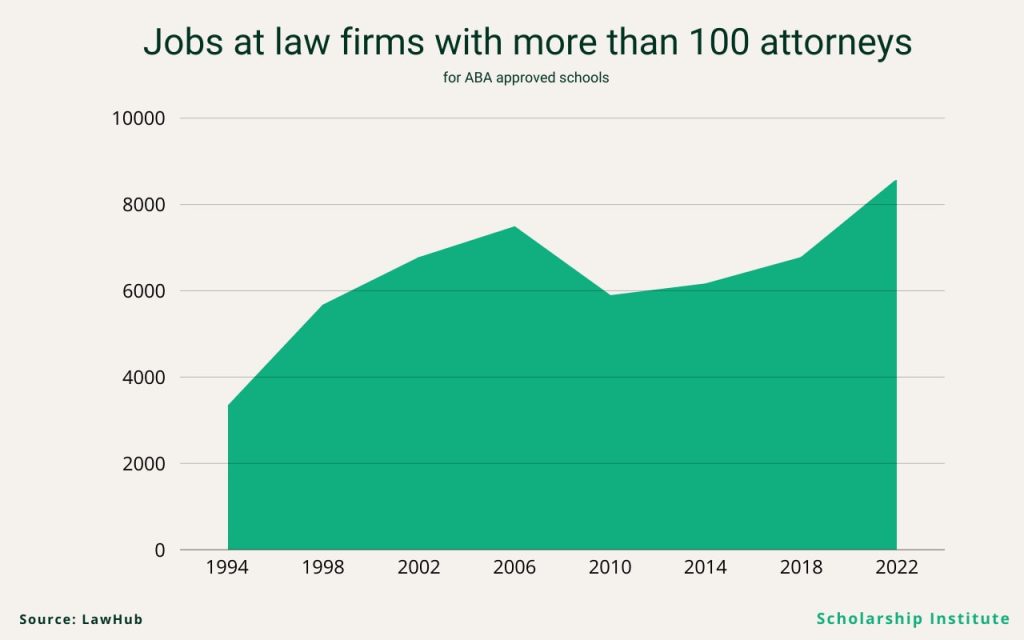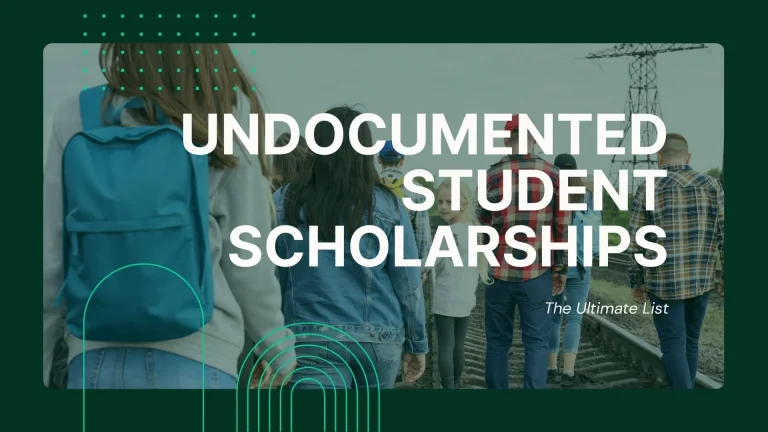Tuition continues to climb for U.S. law schools. The average law school graduate owes $130,000 in student loan debt, and considering facts like inflation and the rise in the cost of living, it’s no surprise that many students are struggling to find resources to afford their law education.
While the number of law graduates remained stable, legal jobs increased. In 2023, the percentage of graduates in full-time legal jobs crossed 80% for the first time since 1991. So, if you are struggling with law school expenses, at Scholarship Institute, we have gathered valuable information on how to apply for scholarships quicker, scholarship recommendations, and some tips to increase the chances of winning a scholarship.

At Scholarship Institute, we make it easier to apply for scholarships by gathering some of the best options that align with your specific background. Start applying now and find new financial support for your degree.
Types of Law School Scholarships
Incoming law students are bright, and there is no doubt they can develop financial skills to budget with what they have, but why not proactively seek financial aid resources? There are tons of scholarships available, and although it sometimes feels like a waste of time to apply for them, they can really alleviate the burden of their education costs and reduce student debt. And why not have extra money and peace of mind while studying?
It’s essential to understand the kind of scholarships that are available for law students. Depending on each student’s criteria (in terms of how much time they want to invest in applying for scholarships), background, and goals, law students can apply for the following:
- Merit-Based Scholarships: These scholarships are awarded based on a student’s achievements, like high grades, athletic ability, leadership, or artistic talent. Colleges, private organizations, and corporations often provide these scholarships to recognize students’ outstanding performance. You can apply for them on digital scholarship platforms or through state or local organizations.
- Need-Based Scholarships: These are designed for students with financial needs and help cover educational expenses for those struggling to afford college. Federal or state programs often offer these scholarship programs, and many universities help students in need after completing the FAFSA form to determine eligibility.
- School-Specific Scholarships: Many colleges only offer scholarships to students attending that specific school. These can be all types, such as merit-based, need-based, based on a student’s intended major or interests, or a mix of them. We recommend talking to your financial advisor and finding out if they offer specific scholarships if they get honors if they can demonstrate financial need or other financial aid programs such as work-study.
- Career-Specific Scholarships: These scholarships are for students pursuing a specific field, such as nursing, education, or engineering. They are designed to encourage studies in highly demanded fields.
- Minority or Diversity Scholarships: These scholarships support students from underrepresented groups, such as racial minorities, women in STEM, LGBTQ+ students, or first-generation college students.
- Military Scholarships: These are available to active-duty military members, veterans, and sometimes their families; these scholarships aim to help by supporting those connected to the military community.
- Athletic Scholarships: As the name indicates, these are awarded to students who excel in sports. They also help recruit talented athletes to college teams. Universities with competitive sports programs usually give them and often require continued athletic participation.

Scholarships for Underrepresented Groups in the Legal Profession
The legal profession is seeing more initiatives to support diverse law students, recognizing that the field of law is enriched by a range of perspectives and experiences. Scholarships for minority law students, such as the ABA Legal Opportunity Scholarship, offer financial support to underrepresented groups, aiming to increase inclusivity across the legal landscape.
In addition, there are scholarships specifically for graduate students or to support LGBTQ+ law students through the LSAC Diversity, Equity, and Inclusion Writing Competition. Resources also extend to law students with disabilities, including the National Federation of the Blind Scholarship, which offers significant aid to students with unique challenges.
Scholarships for Specific Areas of Law
Many scholarships cater to students pursuing specialized legal fields, like those committed to public interest law, who can find support from the Carole Bailey Scholarship.
For ABA-accredited law school students exploring environmental law, there’s the Leopold Schepp Foundation Scholarship. Other notable awards include the Zelle Diversity in Law Scholarship for aspiring litigators in fields such as criminal law and the Chicano Latino Law Foundation Scholarship for students focusing on social justice.

How to Apply for Law School Scholarships
Securing a law scholarship can be a competitive process. Start by thoroughly researching and reviewing opportunities, checking eligibility criteria, and noting important deadlines. Applications usually require personal statements, transcripts, and even references. For extensive funding, apply for federal student aid, including the FAFSA and Direct Loans.
Additional Tips for Law Students
Maximizing your scholarship options means starting early and covering a wide net of opportunities. We recommend applying for multiple scholarships to increase your chances and tailor each application to fit the scholarship’s specific goals (they are usually written in the scholarship statement and guidelines).
Highlight your unique experiences and skills, and don’t hesitate to contact scholarship providers to confirm your application receipt or express your enthusiasm about the opportunity.
Remember: If you’ve received a few scholarship offers and it affects your financial aid, consider negotiating with law schools for an improved package—it’s all about getting the support you need for a successful legal career and communicating your needs.
The New Era of Intellectual Property Law
Intellectual Property Law (IP) is booming with tech and creative industries, and these scholarships recognize the need for diverse perspectives in areas like patent law and entertainment law. For students who are prepared for intellectual property law, scholarships like the Sidney B. Williams, Jr. Scholarship specifically target diverse law students aiming to innovate in this field. Other resources include summer associate scholarship programs and mentorships to provide experience and networking in this high-demand area.
Other Scholarship Resources for Law Students
The journey through law school is made easier with the right resources. The Law School Admission Council (LSAC) offers essential resources for diverse law students, such as the LSAC Diversity, Equity, and Inclusion Writing Competition.
Meanwhile, the American Bar Association (ABA) provides programs like the ABA Legal Opportunity Scholarship to boost diversity in ABA-accredited law schools. The National Association for Law Placement (NALP) is an excellent tool for current law school students navigating career choices, especially with the NALP Directory of Legal Employers, which outlines potential job opportunities.
In addition, colleges that have specific programs for law that are prestigious and well-funded will often have private scholarships available for law students. California has several prestigious colleges with excellent law programs. Check out California scholarships here if you’re looking at law school on the West Coast.

Frequently Asked Questions for Law Students & Scholarships
1. What Are the Chances of Actually Winning One of These Law Scholarships?
Knowing exactly what the chances of getting a law scholarship are is hard to answer, but considering all the factors such as federal financial aid, grants, and the multiple opportunities of diverse, merit, and need scholarships, the chances of winning a scholarship are high. The educational system is aware that law students need help to pay for school, and these forms of financial aid are available every academic year to provide support to students.
2. Do Any of These Scholarships Renew Yearly, or Is It Usually a One-Time Thing?
Many scholarships renew each year, but they usually have strict eligibility requirements, such as maintaining a certain GPA. On the other hand, some of these scholarships require a different application each year and can be a one-time thing.
3. Are There Examples of Personal Statements That Have Won Law Scholarships?
A great personal statement is key to winning a scholarship program, and if you google outstanding school law statements, you can find multiple options for great examples. Some platforms have blogs that describe how to write a personal statement for scholarships.
4. Can These Scholarships Be Combined with Other Aid, like Federal Loans?
The short answer is yes, but each student has to consider the type of scholarship they are applying for and how the financial aid office of the school arranges and sometimes limits the amount of funds available. For example, if you are awarded a scholarship, the financial aid office might reduce the amount of financial aid from other sources, such as institutional scholarships. A good way to solve this concern is to apply for scholarships on digital platforms where the money is directly given to the student.
5. What Are Some Tools for Keeping Track of Deadlines and Requirements for Multiple Scholarships?
Managing several applications at once can be tough, especially given the demands of life and school for current law students. We recommend focusing on one or two more time-consuming applications (usually requiring letters of recommendation, transcripts, and certain academic requirements) and also regularly applying for scholarships with no essay requirements. A couple of hours a week will be more than enough without burnout.
6. How Likely Is It to Land a Summer Associate Position as a 1L, and Do These Positions Often Come with Scholarships?
While most summer associate positions are open to 2Ls, first-year law students do have options. Keep in mind that you’ll need early preparation, high grades, and strong networking so you can demonstrate unique qualities and a strong interest in the firm’s practice areas to be eligible for a summer associate scholarship program.
Want to apply for scholarships but don’t have much time? Get started with multiple no-essay scholarships, get ready to attend law school, and complete your legal education.

Lucy Maddox
Lucy’s international upbringing in Hong Kong and love for literature have shaped her multifaceted background. She attended university in Middlebury, Vermont, before settling in Arlington, Virginia. In her free time, Lucy enjoys True Crime podcasts, thrillers, literary fiction, running, hiking, exploring Washington, D.C.'s newest restaurants, and blogging about her latest travels.






